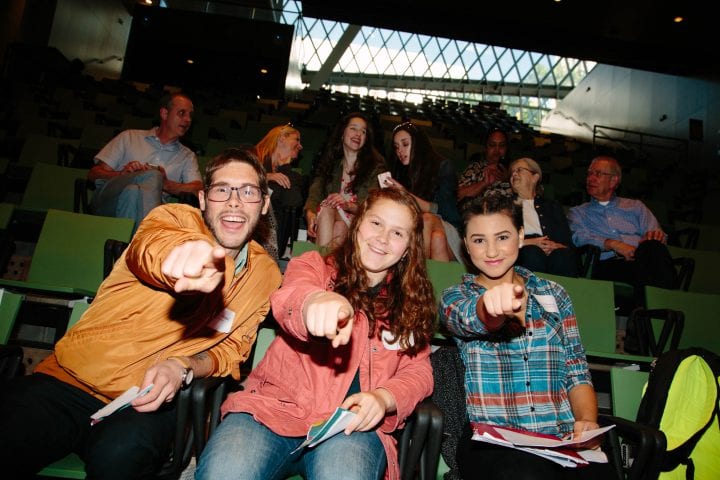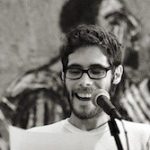
WITS Voices: An Exercise in Identity
November 6, 2017
By Danny Sherrard, WITS Writer-in-Residence
The subject of the exercise is identity, and I’ve heard scary stories. The idea: to bring up themes like race and gender using you (the teaching artist) as the lab rat on the first day of class. What happens is you ask, Who am I? or, What do you know about me already? and the students respond based on what they’ve derived about you from your appearance. You write down what they say on the board and use the themes that surface as jumping-off points for various discussions about identity. And I’d heard that what the students say can sometimes be, well, shattering.
One story that was reiterated by a fellow teaching-artist was about how a student told her she was, Just a privileged white lady going through a mid-life crisis and teaching out of guilt.
Another story involved a colleague being told that he was, Probably not cool enough when he was in high school, so he had to try and be cool in high school now.
The idea, too, is to be completely honest and open about your experience. So, if a student says something like, You act like you’re from Seattle, but I think you grew up in Bellevue, and you grew up in Bellevue, you might respond with, I did grow up there. I’m 425, not 206, it’s true. How could you tell that? and so on to keep creating honest dialogue. The rules are clear: No Sugarcoating. Thus, if the response is in the affirmative to any of the above statements, you’ve gotta say, Yes, you’re right, or, Yes, you’re right and . . . despite how devastating it might be for you.
I think that after the exercise had been introduced to me, I was also told, Get ready: things can get pretty rough with this one.
Nonetheless, I determined I would try it . . .
I don’t know whether I have thick skin or not.
My skin’s density varies by circumstance.
What do I mean by circumstance?
I mean, it’s how I’m used to being
Seen or not seen or being afraid to be
Seen and being afraid to not be seen and
It’s how we can make whole worlds labyrinths
of ourselves invisible, even the ones with life
(Sometimes very specifically the ones with life.
(I think now of the sacrificed, the minotaur…)).
I know what it means to fold my wings up
Like the broken
Accordion I’m carrying on my back down
The street. I don’t know what that means
For you, or you, Circumstance. You who are now
Forgetting to ask, and ask Circumstance, what
Does it mean to be afraid to be seen,
And will they know?
Will the homelessness be rippled out
of my hurried heart? Will the year all I could
Think about was ending every poem ever
Exhume itself? Will the myriad people I am not
Sure existed emerge from a glance in my eyes
Toward the window?
Will they see that glance and memorize it
like the escape route it is, and will they know?
Will they know? or will it just be the easy:
Snow and a poem I wrote while living up
Side down? Maybe it will just be era and euro
Mutt and straight-ish. Maybe. Maybe they will
See, Circumstance, how you weave and carve
The thick and the fragile alike into something
Incomprehensible as the skin upon the hands
—We know them: they are us—
That’ve fashioned dry bone into singing flutes
And sharpened obsidian into survival, and life.)
You’re low-key hella honest, I can tell, was the first response of one of my students after I posed the question, “Who am I?” on the first day of class.
(I said, I don’t know if that’s a good thing.
It is, she assured me.)
The next remark was, I think you’re like somewhere between 24 – 26.
(I’m 32.)
The third statement: You have a hip style, but you also look professional.
(So. . . starting to feel pretty good here. . .)
I like that you say “ya’ll,” a fourth student remarked.
By the end of class, we got there. We wandered into the labyrinth of how we are seen (or not) by the world in which we live. I was told, You’re probably mostly white, and, You know, like. . . a dude. . . We conversed about how to begin dismantling the impossible-seeming walls and even wrote a couple group poems on that first day.
But the initial discussion that day reminded me that the classroom remains a world apart. When we enter the classroom, we do not enter expectation so much as we enter a realm of potential; the outside world shatters, and with kind, imagining eyes we can see the minotaur beyond, revealed in the depths. This, then, is how we, fearlessly, begin to determine the fate of the beast. And not the other way around.
 Danny Sherrard unfolds the kind of space wherein stories are created. With over ten years of experience conducting writing and performance workshops across the globe, Sherrard bares witness to the life-giving power of storytelling. He is the youngest person to have won both the US National Poetry Slam and the World Poetry Cup Paris, France. Sherrard is the author of three collections of poetry and is working on his first novel. He is currently the writer-in-residence at the GLASS BOX art gallery.
Danny Sherrard unfolds the kind of space wherein stories are created. With over ten years of experience conducting writing and performance workshops across the globe, Sherrard bares witness to the life-giving power of storytelling. He is the youngest person to have won both the US National Poetry Slam and the World Poetry Cup Paris, France. Sherrard is the author of three collections of poetry and is working on his first novel. He is currently the writer-in-residence at the GLASS BOX art gallery.